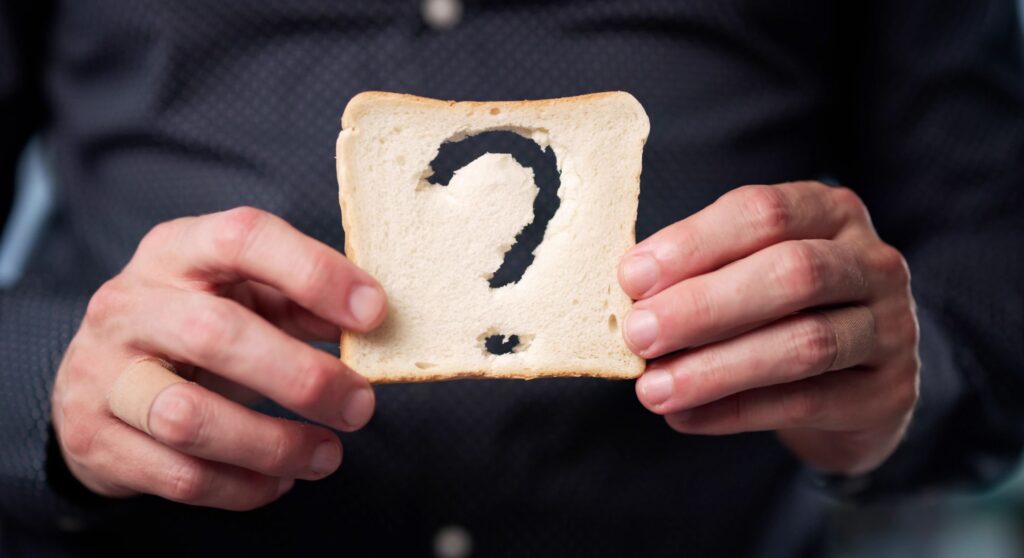About one-third of patients with irritable bowel syndrome (IBS) develop disordered eating habits and perceptions about food that may trigger digestive symptoms and even an unhealthy preoccupation with healthy eating. In particular, many people with the condition believe eating gluten or wheat is the main culprit triggering their symptoms. This prompts them to exclude these foods from their diets without consulting a dietitian, which in turn may lead to more severe IBS symptoms and an altered fecal microbiota composition.
A new randomised, double-blind, sham-controlled crossover trial found gluten and wheat might be safe to eat for many people with IBS, despite their self-perceived sensitivities to these ingredients.
To understand whether gluten and wheat are common triggers, Premysl Bercik at McMaster University in Canada and his colleagues recruited 28 individuals with IBS who experienced improvement on a gluten-free diet. Patients were instructed to discontinue a treatment they perceived as effective. Then they were randomly assigned to consume one of three types of cereal bars, which had the same appearance and taste, daily.
One of the bars contained whole wheat (wheat flour was selected for its highest content of amylase trypsin inhibitors, thought to synergize with gluten to trigger intestinal inflammation), the second contained purified gluten, and the third was free of both ingredients (sham challenge). Patients were told that any of the bars could provoke or worsen their symptoms.
At the end of each intervention, neither the participants nor the researchers knew which bar was consumed. Participants reported their symptoms and provided stool samples to objectively measure gluten intake through the detection of gluten immunogenic peptides.
The authors found that all three challenges (wheat, gluten, and sham) induced symptoms -assessed as a 50-point worsening in IBS symptoms- in a similar proportion of participants: 11 of 28 participants eating the wheat bars, 10 of 28 participants eating the gluten-only bars, and 8 of 28 participants eating the sham bars. By contrast, the negative expectations (ie, nocebo effects) did not worsen symptoms in some patients (non-responders) despite holding beliefs about gluten or wheat. These findings suggest that expectations and beliefs, rather than gluten or wheat, may be driving symptoms in many patients with IBS.
These findings complement earlier studies in patients with functional dyspepsia and non-celiac wheat sensitivity. In patients with functional dyspepsia, fullness and bloating were exacerbated not only by the ingestion of a meal high in fat but also by a meal that the patient perceived as high in fat. Another study acknowledged the importance of gut-brain interactions in individuals who self-reported gluten sensitivity. It found that patients with reported gluten sensitivity who ate gluten and were also told they were eating gluten had significantly worse symptoms.
The nocebo effects not only affected symptom generation but also dietary adherence. Although most cereal bars were self-reported as consumed for each challenge, stool gluten immunogenic peptides revealed that only a third of participants (9/28) actually ate the bars as instructed by the dietitian. While patients were later informed which bars triggered symptoms, most did not alter their beliefs or diets.
While the sham-controlled crossover design provides a robust methodology for exploring the role of food triggers in patients with IBS, Sigrid Elsenbruch at the University of Duisburg-Essen in Germany acknowledged in an accompanying editorial that the fact that participants were told any of the bars could worsen their symptoms may have enhanced the nocebo effect compared to a real clinical practice setting. Also, the absence of a control group without negative framing (selected participants had strong beliefs about food triggers) makes it challenging to investigate the convergence of food ingredients and expectancy effects on generating symptoms.
To sum up, while some people with IBS might have a gluten sensitivity, these findings suggest that for others, it is the belief itself that is driving their symptoms and subsequent dietary choices to avoid gluten or wheat. Integrating expectancy research into current management strategies for disorders of gut-brain interaction is the next step, as well as promoting collaboration between gastroenterologists, dietitians, and psychologists to transform future research and personalize patient care, particularly improving patient-provider communication to adjust patient beliefs on food triggers.
References:
Van Gils T, Simrén M. The role of gluten and wheat in irritable bowel syndrome and noncoeliac gluten or wheat sensitivity. Curr Opin Gastroenterol. 2025; 41(3):164-174. doi: 10.1097/MOG.0000000000001090.
Lenhart A, Dong T, Joshi S, et al. Effect of exclusion diets on symptom severity and the gut microbiota in patients with irritable bowel syndrome. Clin Gastroenterol Hepatol. 2022; 20(3):e465-e483. doi: 10.1016/j.cgh.2021.05.027.
Larissa Seiler C, Horacio Rueda G, Miguel Miranda P, et al. Effect of gluten and wheat on symptoms and behaviours in adults with irritable bowel syndrome: a single-centre, randomised, double-blind, sham-controlled crossover trial. Lancet Gastroenterol Hepatol. 2025; 10(9):794-805. doi: 10.1016/S2468-1253(25)00090-1.
Feinle-Bisset C, Meier B, Fried M, et al. Role of cognitive factors in symptom induction following high and low fat meals in patients with functional dyspepsia. Gut. 2003; 52(10):1414-1418. doi: 10.1136/gut.52.10.1414.
CG de Graaf M, Lawton CL, Croden F, et al. The effect of expectancy versus actual gluten intake on gastrointestinal and extra-intestinal symptoms in non-coeliac gluten sensitivity: a randomised, double-blind, placebo-controlled, international, multicentre study. Lancet Gastroenterol Hepatol. 2024; 9(2):110-123. doi: 10.1016/S2468-1253(23)00317-5.
Elsenbruch S. Unravelling the power of nocebo in symptom response to food challenge in irritable bowel syndrome. Lancet Gastroenterol Hepatol. 2025; 10(9):780-781. doi: 10.1016/S2468-1253(25)00126-8.
Guadagnoli L, Heathcote LC, Van Oudenhove L, et al. The psychobiological model of disorders of gut-brain interaction: introduction of a novel, integrated, and testable model. Lancet Gastroenterol Hepatol. 2025. doi: 10.1016/S2468-1253(25)00205-5.

